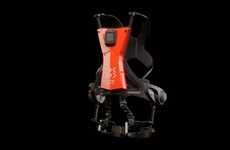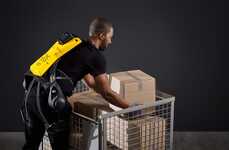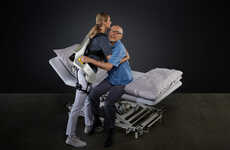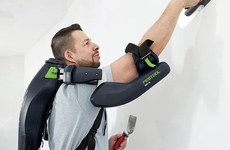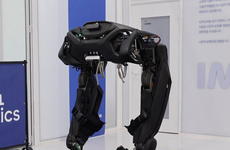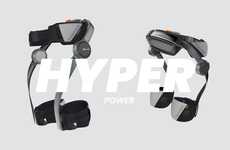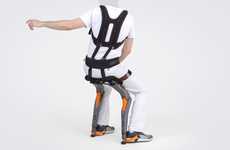
Hyundai's New Iron Man Suit Helps Wearer's Lift Heavy Objects
Katherine Pendrill — May 14, 2016 — Tech
References: blog.hyundai.co.kr & businessinsider
Hyundai recently debuted a new robotic exoskeleton called the 'Iron Man suit,' which allows the wearer to lift ultra-heavy objects. With companies such as BMW, Panasonic and Audi already working on their own exoskeleton suits, Hyundai is now joining the growing industry of wearable robotics.
Hyundai describes its new Iron Man suit as a "wearable robot" exoskeleton that is designed to give the wearer super strength. Not only can the wearer lift hundreds of kilograms while wearing the suit, but they can also move significantly faster. The suit is ideal for workers who frequently need to lift or move heavy objects, but it may also helps those with limited mobility such as the handicapped or elderly move about more more freely.
While Hyundai's new exoskeleton is currently just a prototype, the suit could soon be used to enhance the mobility of countless individuals.
Hyundai describes its new Iron Man suit as a "wearable robot" exoskeleton that is designed to give the wearer super strength. Not only can the wearer lift hundreds of kilograms while wearing the suit, but they can also move significantly faster. The suit is ideal for workers who frequently need to lift or move heavy objects, but it may also helps those with limited mobility such as the handicapped or elderly move about more more freely.
While Hyundai's new exoskeleton is currently just a prototype, the suit could soon be used to enhance the mobility of countless individuals.
Trend Themes
1. Wearable Robotics - The growing trend of wearable robotic exoskeletons is providing new opportunities for enhancing human strength and mobility.
2. Super Strength - The development of exoskeleton suits that give the wearer super strength opens up opportunities for industries such as manufacturing, construction, and logistics.
3. Assistive Mobility - Exoskeleton suits that enhance mobility have the potential to disrupt industries focused on serving individuals with limited mobility such as healthcare, rehabilitation, and aged care.
Industry Implications
1. Manufacturing - The manufacturing industry can explore the use of wearable exoskeletons to improve worker productivity and safety.
2. Construction - The construction industry can adopt exoskeleton technology to enhance worker performance and reduce the risk of injuries.
3. Healthcare - Exoskeleton suits with mobility enhancement capabilities present new possibilities in the healthcare industry for assisting individuals with mobility challenges.
5.8
Score
Popularity
Activity
Freshness


